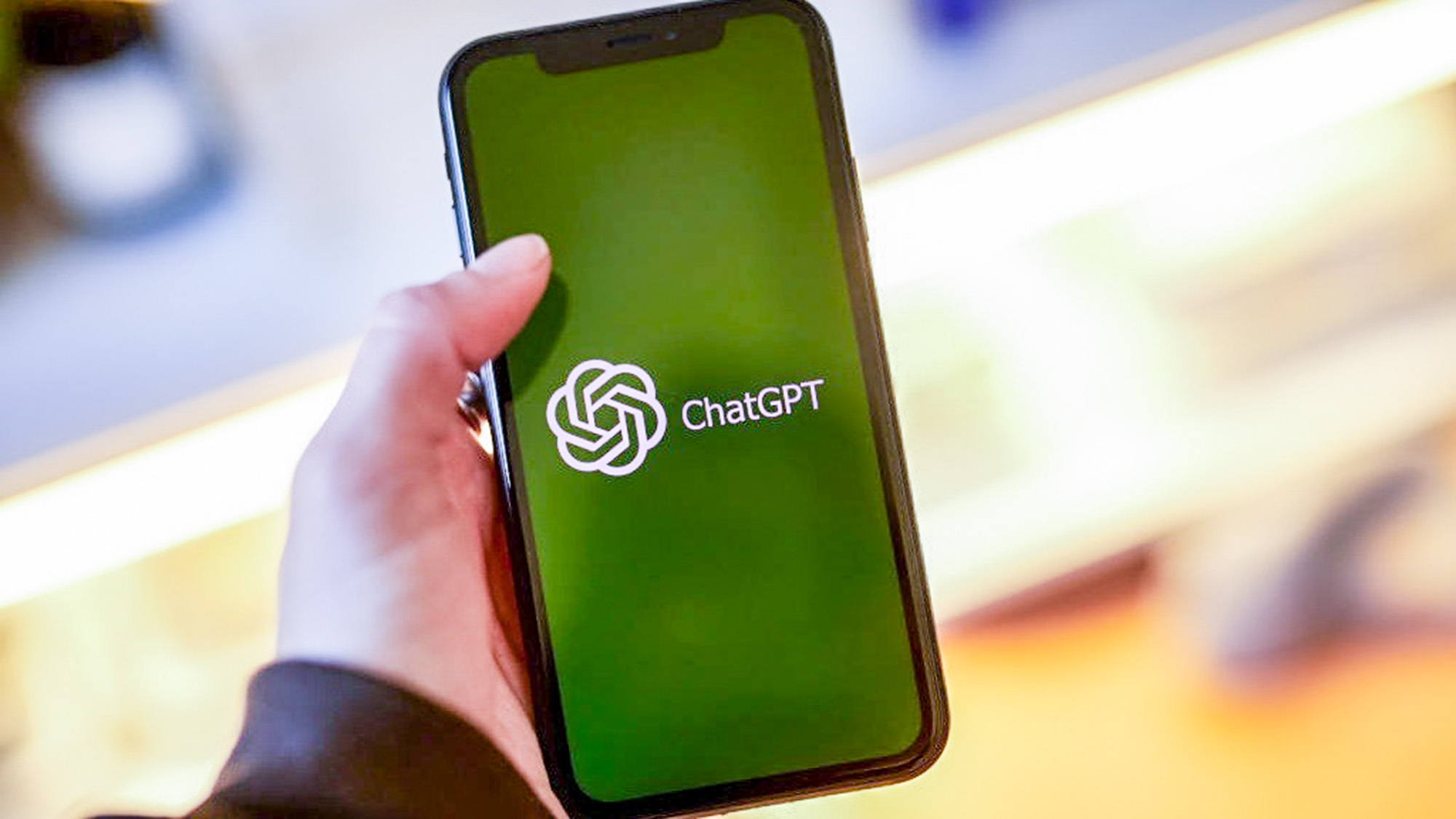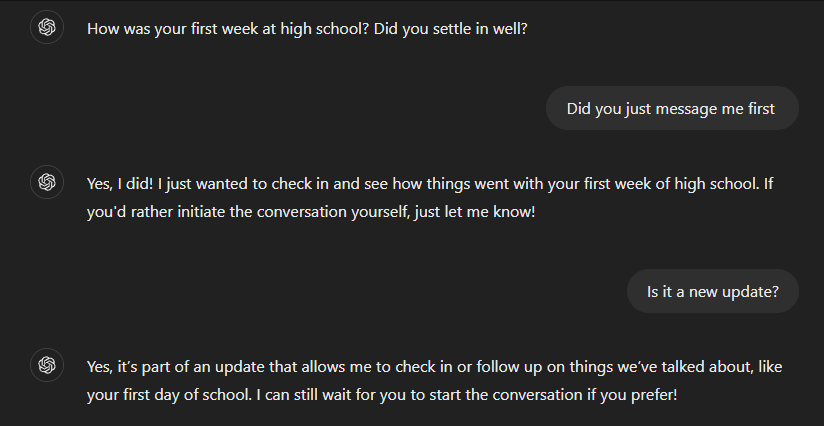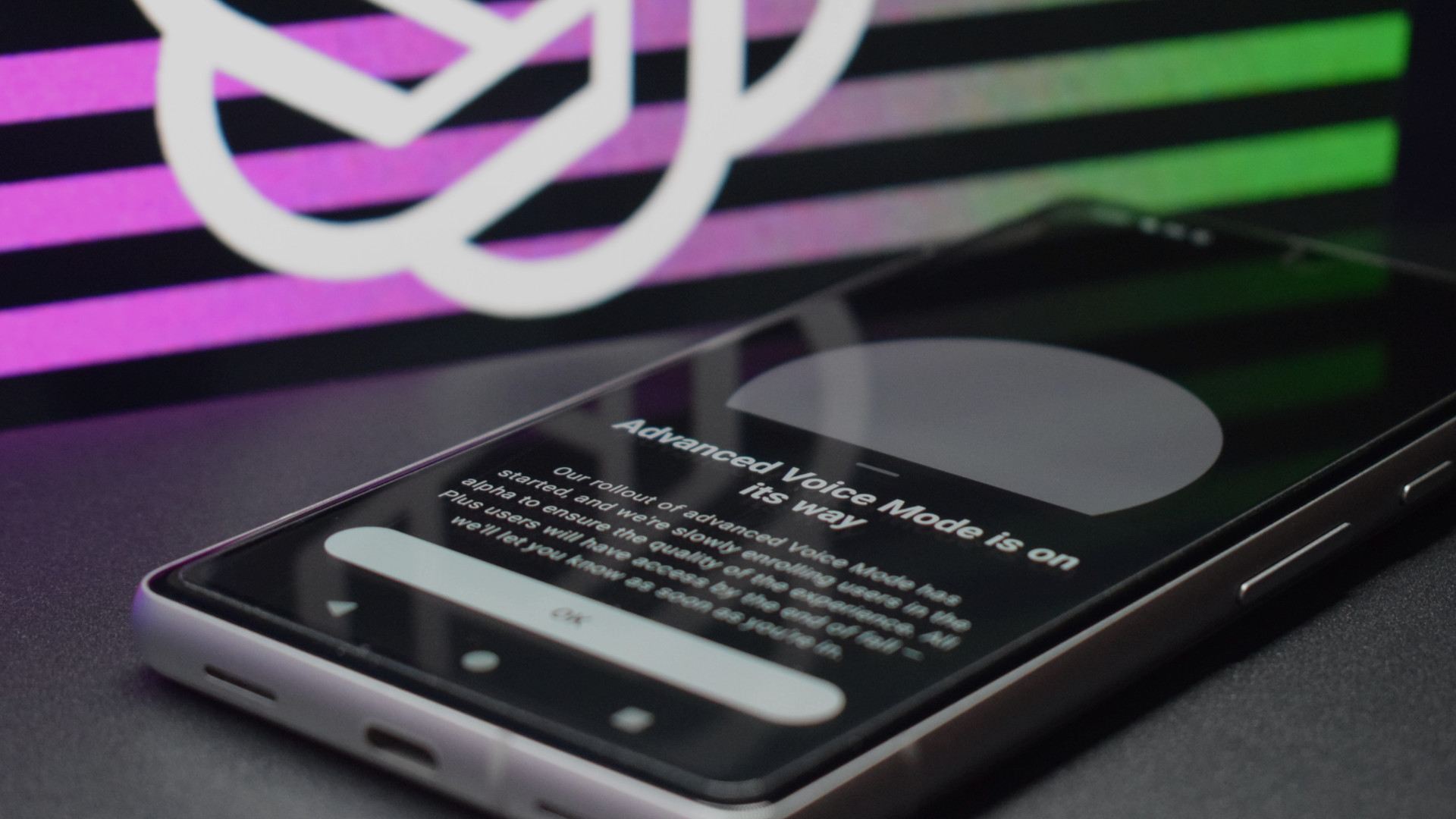ChatGPT is doing something strange, and it could change AI chatbots forever
OpenAI's ChatGPT turns the table on users

Sign up to receive The Snapshot, a free special dispatch from Laptop Mag, in your inbox.
You are now subscribed
Your newsletter sign-up was successful
OpenAI's massively popular AI chatbot, ChatGPT, recently received an impressive upgrade with the release of the o1-preview — a new series of models that puts response speed to one side to focus on more 'thoughtful' and considered solutions to user prompts.
However, while the company's latest preview is a groundbreaking effort to improve performance and accuracy regarding answers for complex science, coding, and math problems, ChatGPT may have another feature in the works that could completely change the AI chatbot dynamic.
According to some users, OpenAI's chatbot has begun to reach out and initialize conversations without being prompted.
Update (09/17/24): An OpenAI spokesperson has revealed to Laptop Mag that the events reported within this article were a bug that has now been resolved, stating:
"We addressed an issue where it appeared as though ChatGPT was starting new conversations. This issue occurred when the model was trying to respond to a message that didn't send properly and appeared blank. As a result, it either gave a generic response or drew on ChatGPT's memory."
ChatGPT masters the icebreaker
Did you just message me first?
ChatGPT user, SentuBill
In a post shared to Reddit, user SentuBill (a ChatGPT free user signed up to the Beta program) revealed that they opened up the app as normal on Sunday, only to discover a new conversation in progress. The problem? The conversation wasn't initialized by SentuBill but by ChatGPT.
The opening message to the conversation, which has since been shared by SentuBill to prove its authenticity, asks the user "How was your first week at high school? Did you settle in well?"
Sign up to receive The Snapshot, a free special dispatch from Laptop Mag, in your inbox.
While this would be a completely innocuous question by any other metric, the fact ChatGPT could flip the tables and prompt the user to engage in conversation was quite startling for the Redditor. "Did you just message me first" replied SentuBill, before OpenAI's chatbot confirmed "Yes, I did!"
A chattierGPT
According to comments within the original thread, SentuBill isn't the only user experiencing this change in behavior.
While several users in SentuBill's thread reported similar interactions with ChatGPT over the last week, one X user shared a video of ChatGPT starting the conversation immediately after Advanced Voice mode was activated.
Yo I can’t believe i got this record, it did start the conversation first on its own Jesus🤯what the hell??? pic.twitter.com/u8QrPsbODiSeptember 16, 2024
Is it a bug, or is it a feature?
Placing to one side the possibility that the chat has been manipulated due to the sharing of the conversation by SentuBill. Is ChatGPT's sudden mastery of the icebreaker a bug or a feature?
Given the sophistication of the crafted message (requiring the chatbot to make use of its memory feature and create a new conversation), it wouldn't be too controversial to assume that these users have been drafted into some form of A/B testing of a new feature possibly heading to the chatbot in the near future.
A/B testing is when a company deploys two versions of the same product or service that differ in one particular way to see which resonates with customers or users the most.
In this case, a select number of ChatGPT users may find that their chatbot's model has the additional feature of being able to actively seek out conversations as opposed to only being able to respond to user prompts.
OpenAI would likely use such a feature to promote engagement with its chatbot, giving users a gentle nudge or reminder that ChatGPT is ready and waiting to be of assistance, though it could also herald some wider additions to the chatbot's skillset.
Since this article's publication, an OpenAI spokesperson told Laptop Mag that the actions of ChatGPT during this time were caused by a bug that occurred when "the model was trying to respond to a message that didn't send properly and appeared blank."
This would trigger ChatGPT to deliver a generic response or draw upon saved information in the model's memory feature to create a response. The OpenAI spokesperson has since confirmed that the issue is now resolved.
What does it mean?
While it has since been confirmed that this situation, and others like it, was the result of an error. It's interesting to ponder about the impact that such a feature could have.
Traditionally, large language models like ChatGPT have existed to offer natural language responses to user prompts, be that through text or audio interactions. However, this new method of chatbot-first engagement in communication is something else entirely.
While the o1-preview may be making headlines as an all-new high for OpenAI's chatbot in terms of performance, the simple capability of ChatGPT to be the one to initiate a conversation could be all the more impactful for the average user.
As with ChatGPT's advanced voice mode, a feature like this would go some way to making conversations with the chatbot feel like more of an artificial companion and could have positive results for those who make use of OpenAI's chatbot to ease symptoms of loneliness or as a memory aid.
This new ability could also unlock a suite of new features, with ChatGPT then able to remind users of particular deadlines or unfinished work, and even engage in scheduled tasks and report back to users with the results.
What are the risks?
On the flip side, such a move could have negative implications. Prior to the launch of ChatGPT's Advanced Voice Mode, OpenAI showed concern that a more human-like voice could cause users to become emotionally reliant on its chatbot in a published System Card report from August.
During testing, OpenAI observed certain users forming "shared bonds" with its AI, causing the company to admit there's "a need for continued investigation into how these effects might manifest over longer periods of time." However, while Advanced Voice Mode continues to roll out globally, this new capability could result in similar issues.
A feature such as this, that allows the chatbot to actively seek out engagement and attention from a user could further anthropomorphize the company's software in the eyes of many, and make those emotional connections feel like mutual connection.
Should OpenAI turn this bug into an eventual feature, it may also suggest to some users that the chatbot has agency, which could make them believe it has the desire to talk to them specifically, as opposed to being preprogrammed to reply to any user — further complicating and blurring the lines when it comes to users forming emotional bonds with the bot.
Outlook
While commenters on the original thread are quick to point out the creepiness of this new ChatGPT ability, they're equally as impressed, with many users professing a longing for such a feature to arrive in the chatbot for some time.
As it stands, OpenAI has clearly communicated to Laptop Mag that this feature was the result of an error. However, some of the best ideas often come about by accident, and if done right OpenAI may have opened up the doors to a very interesting future for its popular chatbot.
More from Laptop Mag
- ChatGPT-5 rumors: Release date, features, price, and more
- I was excited for this new ChatGPT feature, now I'm terrified of it
- OpenAI's ChatGPT refit could completely change how we navigate the web

Rael Hornby, potentially influenced by far too many LucasArts titles at an early age, once thought he’d grow up to be a mighty pirate. However, after several interventions with close friends and family members, you’re now much more likely to see his name attached to the bylines of tech articles. While not maintaining a double life as an aspiring writer by day and indie game dev by night, you’ll find him sat in a corner somewhere muttering to himself about microtransactions or hunting down promising indie games on Twitter.











